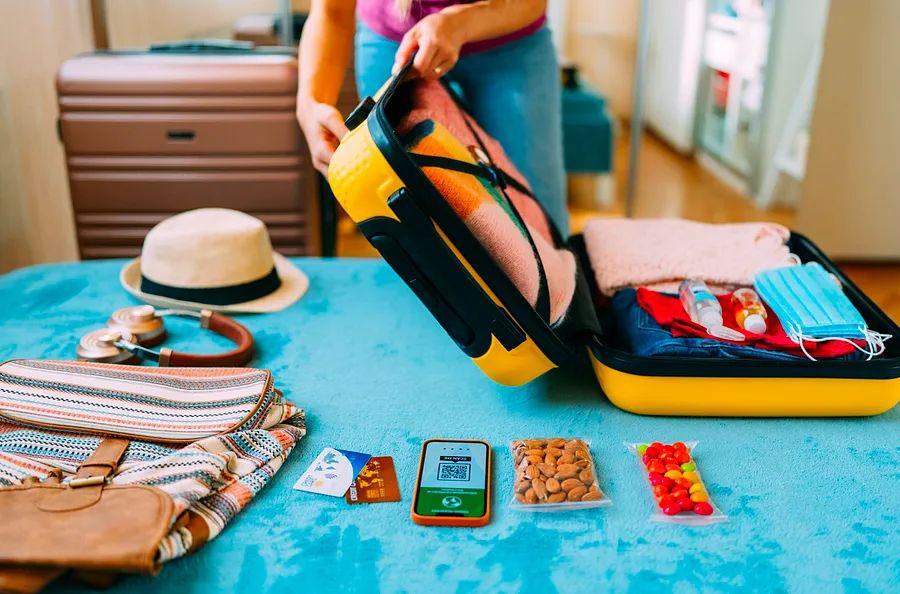Is it permissible to bring snacks on a cruise? Essential information about carrying your own food and beverages

With buffets, dining rooms, specialty restaurants, and grills on the pool deck, you might think bringing your own food on a cruise is unnecessary. However, you may find yourself craving a granola bar between meals or during an extended shore excursion.
Perhaps you or a travel companion has dietary restrictions or needs to take medication with food. Or maybe you have picky eaters in your group who may not enjoy the dinner options, or a partner who experiences late-night cravings but wants to avoid the cost of room service.
So, what are the rules regarding bringing snacks on a cruise? Is it permitted, and if so, what are the limitations? Can you also bring your own beverages on board?
Here’s everything you should be aware of.
Important: If you have specific dietary needs or restrictions, it's wise to reach out to your cruise line’s special requests department well ahead of your sailing to ensure they can accommodate your food needs or allow you to bring it on board.
Is it allowed to bring food on a cruise?
 D3SIGN/GETTY IMAGES
D3SIGN/GETTY IMAGESThe simple answer is yes, you can bring food. However, there are limitations regarding the types of food and their packaging. For instance, you can't board with a large batch of grandma's freshly baked cookies or the ingredients for your own salad.
What types of snacks am I allowed to take on a cruise?
Cruise ships generally allow any prepackaged food items. This includes things like granola bars, protein bars, cereal bars, packs of crackers and cookies, nuts, beef jerky, and bagged snacks like chips, crackers, and popcorn. Baby food and formula are also permitted.
Candy is welcome too, so feel free to pack as many fruit snacks, M&M's, and licorice as you desire.
The catch is that your snacks must be shelf-stable and properly sealed. So, don’t open a large bag of Reese's Pieces, Life Savers Gummies, or Doritos, eat a few handfuls, and then try to board with the bag open.
Additionally, avoid bringing any fresh food, items that need refrigeration, or homemade dishes in your own containers. If it could spoil during your cruise, it’s best to leave it at home.
Are you allowed to bring drinks on a cruise?
 D3SIGN/GETTY IMAGES
D3SIGN/GETTY IMAGESThe answer isn’t a straightforward yes or no. You can bring beverages, but there are restrictions, particularly regarding alcohol.
Each cruise line has its own regulations, but typically, each guest can bring a limited quantity of their favorite nonalcoholic beverages, such as water, juice, soda, coffee, sports drinks, and energy drinks. Lines that permit this include Carnival Cruise Line, Celebrity Cruises, Disney Cruise Line, Princess Cruises, Royal Caribbean, and Virgin Voyages. However, Holland America (with the exception of limited bottled water), MSC Cruises, and Norwegian Cruise Line do not allow this.
Keep in mind that most major cruise lines offer alternative milks, including soy and almond. Some also provide oat and coconut milks. If you need a specific type, your cruise line can likely accommodate you with advance notice, so you won’t have to bring your own.
Regarding alcohol policies, nearly all mainstream cruise lines permit one bottle of wine, sparkling wine, or Champagne of up to 750 mL per person aged 21 and over. There may be a corkage fee ranging from $15 to $25 per bottle; some lines only charge this fee if you consume the bottle outside your cabin.
Most major cruise lines (except for Disney Cruise Line, which permits up to six cans of beer per person aged 21 and over) do not allow guests to bring their own beer or liquor on board.
The exception lies with luxury cruise lines. Since they include alcohol in their pricing and don’t want to lose out on potential onboard revenue, they allow passengers to bring as much alcohol as they wish, as long as it’s reasonable and regardless of type.
All cruise lines permit passengers to bring distilled water for use in medical devices, such as CPAP machines.
How to carry drinks on a cruise
When traveling with non-alcoholic beverages, the common rule is that each guest can bring up to 12 cans or cartons. Occasionally, plastic bottles may be permitted, but it’s best to verify with your cruise line. Glass bottles are typically not allowed. Beverages must be sealed; open containers are not permitted, even if they meet the above criteria.
If you’re bringing wine, sparkling wine, or Champagne, glass bottles are allowed.
All beverages must be carried on board and cannot be placed in checked luggage. If drinks are discovered in your checked bags during embarkation, your luggage will be held until you can retrieve it. You’ll need to open your bags in front of security personnel, who will determine if your items comply with the ship's regulations. If they don’t, your items will be confiscated.
Despite these rules, some passengers still attempt to sneak alcohol on board. It’s not worth the risk of getting caught, having your alcohol taken away, and being labeled a cheapskate or a rule-breaker.
Is it permissible to take food off a cruise ship? What about drinks?
The answer depends on the types of food and beverages. In many ports of call, you can take prepackaged items, but fresh food will be confiscated. For instance, don’t expect to take fresh fruit from the breakfast buffet for a midday snack; it often won’t be allowed. In some ports, including certain locations in Mexico, officials use trained dogs to detect prohibited produce.
Ports tend to be more lenient regarding beverages, especially in warm-weather destinations where staying hydrated is crucial. However, be wise about your choices; bottled water (whether single-use or refillable) is a smarter option than to-go cups of coffee, which may be restricted.
Are you allowed to bring food or drink items back to your ship from port?
 DANNY LEHMAN/CARNIVAL CRUISES
DANNY LEHMAN/CARNIVAL CRUISESThe guidelines for bringing items back on board are similar to those for boarding the cruise. You can return with prepackaged, shelf-stable foods, but you should steer clear of anything homemade, fresh, not in sealed packaging, or not shelf-stable. I once had to dispose of (read: eat and share as many as I could before getting back on) six exquisite doughnuts because I was unaware they weren’t allowed. I only found out when a security guard informed me I couldn’t board the tender boat with my treats.
You may also bring nonalcoholic beverages that are sealed and within your cruise line’s specified limits.
The key difference between bringing alcohol on board while at port and during embarkation is that passengers are permitted to do so—though with certain conditions.
Cruise lines recognize that travelers often indulge in duty-free booze as souvenirs. If you decide to buy a bottle (or more) to take home, you can bring it back to your ship, but you won’t be able to keep it with you.
Upon reboarding and passing through security, you must leave your purchases with a crew member. They will record your name and cabin number, and you can either collect your items on the final night of the cruise or have them delivered to your room. The same policy applies to bottles bought in the onboard shops.
Have cruise inquiries? TPG has your answers:
- Planning for a cruise? Here are items that are not allowed on board
- What is baked Alaska, and why is it celebrated on cruise ships?
- What are the largest cruise ships in existence?
- Who are gentlemen hosts on cruises and what do they do?
- What is the Jones Act and how does it affect cruise ships?
- What exactly is a lido deck on a cruise ship?
- What is a cruise cabin guarantee and can it save you money?
- How does a cruise ship concierge differ from a butler?
Evaluation :
5/5



